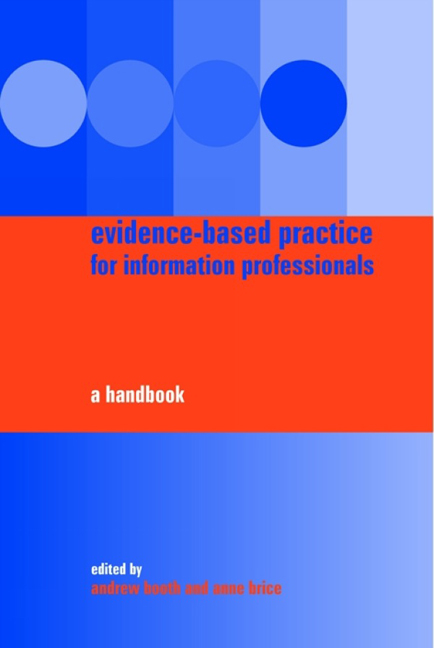Book contents
- Frontmatter
- Contents
- Foreword
- Editors and contributors
- Part 1 The context for evidence-based information practice
- 1 Why evidence-based information practice?
- 2 A brief history of evidence-based practice
- 3 Evidence-based information practice: a prehistory
- 4 How good is the evidence base?
- 5 Why don't librarians use research?
- Part 2 Skills and resources for evidence-based information practice
- Part 3 Using the evidence base in practice
- Index
2 - A brief history of evidence-based practice
from Part 1 - The context for evidence-based information practice
Published online by Cambridge University Press: 08 June 2018
- Frontmatter
- Contents
- Foreword
- Editors and contributors
- Part 1 The context for evidence-based information practice
- 1 Why evidence-based information practice?
- 2 A brief history of evidence-based practice
- 3 Evidence-based information practice: a prehistory
- 4 How good is the evidence base?
- 5 Why don't librarians use research?
- Part 2 Skills and resources for evidence-based information practice
- Part 3 Using the evidence base in practice
- Index
Summary
Introduction
This chapter reviews the growth of evidence-based practice. It does not offer a comprehensive history of the relationship between research and practice, but highlights the main landmarks and initiatives, initially in healthcare, but also in such areas of practice as education, social care, and policy. It describes the significant effect the evidence-based healthcare movement has had on the role and practice of librarians, focusing on the UK in particular.
Although single events may appear to be major catalysts of change, in retrospect any trend is a composite of diverse and complex social, political and technological change. The current context as it affects further development of evidence- based practice will be discussed.
Definitions and debates
There are many definitions of evidence-based practice in the literature (Critical Appraisal Skills Programme, 2003). The one that we feel best encapsulates the core concepts of evidence-based clinical practice states that it is ‘an approach to decision making in which the clinician uses the best evidence available, in consultation with the patient, to decide upon the option which suits the patient best’ (Gray, 2001).
The evidence-based movement was based on the concept that practice should be based on up-to-date, valid and reliable research. It is difficult to argue with such a simple and direct message. The term ‘evidence-based’ was adopted deliberately to challenge prevailing practice at the time and to provoke practitioners into proving that they were up-to-date with research evidence, and incorporating that evidence into their practice (Gray, 2001). The term is now accepted and in universal usage, but at the start it met with negative reactions from the medical establishment, and generated ridicule and controversy (Feinstein and Horwitz, 1997; Grahame-Smith, 1995; Isaacs and Fitzgerald, 1999; Lancet Editorial, 1995; Molesworth, 1998; Sackett, 1995). Criticism ranged from evidence-based medicine being ‘old hat’ to it being a dangerous innovation, a threat to clinical autonomy, aimed at rationing healthcare and suppressing clinical freedom through ‘cook book’ medicine (Sackett et al., 1996).
- Type
- Chapter
- Information
- Evidence-based Practice for Information ProfessionalsA Handbook, pp. 13 - 23Publisher: FacetPrint publication year: 2004
- 2
- Cited by



